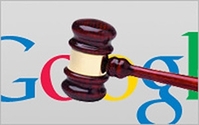Google Sued Over Headshot On Sexyexecs Blog
- by Wendy Davis @wendyndavis, January 7, 2014
 Insurance company ARAG and Ann Dieleman, its chief marketing officer, have sued Google for refusing to remove her headshot from a blog it hosts called Sexyexecs.
Insurance company ARAG and Ann Dieleman, its chief marketing officer, have sued Google for refusing to remove her headshot from a blog it hosts called Sexyexecs.
Sexyexecs posted Dieleman's headshot in 2009, according to a complaint filed by Dieleman and ARAG in the Southern District of Iowa. Dieleman and ARAG allege that the photo was taken in 2005 and that ARAG registered a copyright in it last year. Soon after doing so, Dieleman's lawyer asked Google to take down the photo, according to the lawsuit.
The company refused, citing its “policies concerning content removal,” according to court papers. “As always, we encourage you to resolve any disputes directly with the blogger in question,” the company said in a March email to ARAG's representative, according to papers filed with the complaint.
The blog Sexyexecs, which appears to been active between 2009 and 2011, contains around 250 posts of corporate headshots and accompanying mocking commentary. One post criticizes an executive's eyeglass frames, while another post calls an executive “so anonymous he practically melts into the wall.”
Dieleman and ARAG are now seeking monetary damages and an injunction forcing Google to take down the photo. “Google is aware of facts and circumstances from which the infringing activity -- posting the copyrighted image -- is apparent. Upon obtaining actual knowledge of infringing or facts and circumstances indicating that infringing activity is apparent, Google did not act expeditiously to remove or disable access to, the copyrighted image,” the lawsuit alleges.
The Digital Millennium Copyright Act provides that companies that provide platforms for users to post content aren't liable for copyright infringement by users -- as long as the Web companies remove infringing material upon request. But even when companies refuse to take down a user's content, they aren't liable for infringement if the user made fair use of the material.
Courts decide fair use questions by considering factors such as whether the use affects the market value for the original and the blogger added commentary to the material. In this case, there's a “very strong” argument for fair use, according to Internet legal expert Venkat Balasubramani. “The use is not commercial and certainly not directly competitive, doesn't affect the market for licensing the particular photos, and while offbeat, the use is certainly a form of commentary,” he says in an email to Online Media Daily.
Google has not yet responded to a request for comment.


